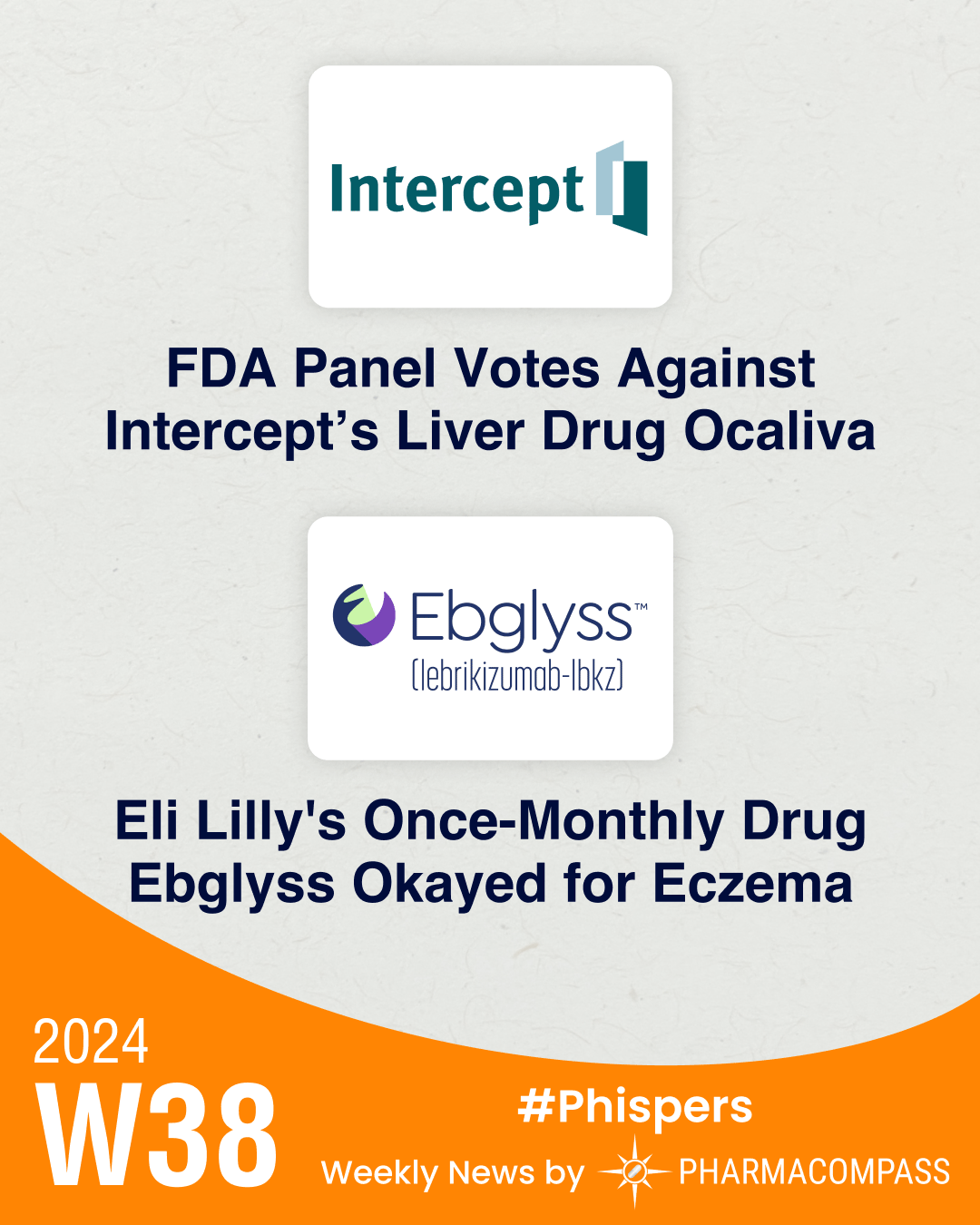
By PharmaCompass
2024-09-19
Impressions: 1,056 (Article) || 14 (Video)
Intercept Pharmaceuticals faced a major setback as a US Food and Drug Administration (FDA) panel voted against the confirmatory data for its liver drug Ocaliva. FDA had granted accelerated approval to Ocaliva in 2016 for primary biliary cholangitis, a disease in which bile ducts are slowly destroyed after becoming inflamed. Ocaliva maybe withdrawn from the market, post a final decision by FDA on October 15.
Eli Lilly has scored another win in immunology as its drug Ebglyss bagged an FDA approval to treat eczema. The American drugmaker is investing an additional US$ 1 billion in its Irish manufacturing facility that produces biological active ingredients, including those used in its Alzheimer’s treatment Kisunla.
FDA also approved AstraZeneca’s Fasenra (benralizumab) for the treatment of adult patients with eosinophilic granulomatosis with polyangiitis (EGPA), a rare, immune-mediated vasculitis that can be fatal. And, Novartis’ breast cancer drug Kisqali has received FDA’s expanded approval to treat early-stage breast cancer.
In deals, Organon, a women-focused company, is acquiring Dermavant Sciences for up to US$ 1.2 billion. Novo Nordisk has partnered with Korro Bio in a US$ 530 million deal to develop RNA editing genetic medicines for cardiometabolic diseases.
In trial news, GSK announced positive topline data from a phase 3 trial on the co-administration of its shingles and RSV vaccines. Co-administration of the two vaccines was found to be equally effective and well tolerated.
Ascendis Pharma achieved a late-stage win for its dwarfism drug TransCon CNP. And Merck and Daiichi Sankyo announced positive results from a late-stage trial on their antibody-drug conjugate (ADC) for non-small cell lung cancer (NSCLC).
FDA panel votes against Intercept’s liver drug Ocaliva; final decision on Oct 15
Intercept Pharmaceuticals faced a major setback as FDA’s Gastrointestinal Drug Advisory Committee voted against the confirmatory data for Ocaliva (obeticholic acid), their liver disease drug. It was granted accelerated approval in 2016 for primary biliary cholangitis. The panel’s decision, with 13 out of 14 members voting that the data doesn’t adequately prove Ocaliva’s clinical benefit, raises doubts about its future. A final decision by the FDA is expected by October 15, which could result in Ocaliva’s withdrawal from the market.
Lilly scores another immunology win as FDA approves Ebglyss for eczema
FDA has approved Eli Lilly’s new eczema drug, Ebglyss (lebrikizumab), based on three studies involving over 1,000 patients with moderate-to-severe eczema who were unable to control their symptoms with topical medicines or other systemic treatments. Unlike Dupixent (dupilumab), which requires twice-monthly dosing for adults, Ebglyss can be dosed once-a-month, a feature analysts noted as attractive to both experts and patients. This approval marks the third FDA nod for Lilly’s immunology unit in three years.
FDA expands approval of Novartis’ Kisqali: FDA has expanded the approval of Novartis’ breast cancer drug Kisqali (ribociclib) to include patients with earlier stages of the disease. Previously approved for breast cancer that has spread, Kisqali can now be used to treat HR-positive, HER2-negative early breast cancer, significantly broadening its reach. This expanded approval puts Kisqali in direct competition with Eli Lilly’s Verzenio (abemaciclib), which has been a strong player in the early breast cancer treatment market, though it is limited to patients with nodal involvement. Kisqali, on the other hand, is available to a broader group of patients.
Astra’s Fasenra okayed for rare, immune-mediated vasculitis: FDA has approved AstraZeneca’s Fasenra (benralizumab) for the treatment of adult patients with eosinophilic granulomatosis with polyangiitis (EGPA). EGPA is a rare, immune-mediated vasculitis that can result in damage to multiple organs. GSK’s Nucala is the only other drug approved to treat EGPA. Fasenra won FDA’s approval by showing non-inferiority to Nucala in a phase 3 trial. Fasenra is already approved as an add-on maintenance treatment for severe eosinophilic asthma.
Lilly to invest additional US$ 1 bn in Ireland to enhance Alzheimer’s med production
Eli Lilly has announced a significant US$ 1 billion expansion of its manufacturing operations in Ireland, bringing its total investment to US$ 2 billion. The Limerick facility will focus on producing biologic active ingredients, including donanemab for its recently approved Alzheimer’s treatment Kisunla. This adds another 150 jobs to the previously announced 300 jobs at the site.
Organon to acquire Roivant for up to US$ 1.2 billion: Organon, a women focused company, is acquiring Dermavant Sciences, a Roivant company, for up to US$ 1.2 billion. The deal involves an upfront payment of US$ 175 million, with the remaining to be paid on the achievement of certain milestones.
Novo partners Korro for RNA editing genetic medicines: Novo Nordisk has entered into an all-inclusive US$ 530 million deal with Korro Bio to collaborate on two cardiometabolic-related targets. This partnership leverages Korro’s Oligonucleotide Promoted Editing of RNA (OPERA) platform, which aims to “use an oligonucleotide to co-opt a natural process in the human body to make changes in mRNA encoding the protein, leaving the DNA genome unaltered.” This approach could potentially address previously undruggable targets for cardiometabolic diseases, such as obesity, diabetes, and cardiovascular conditions.
Meanwhile, Novo Nordisk expects its diabetes drug, Ozempic (semaglutide), to be included in the US government’s 2027 list for Medicare price negotiations, as per a Bloomberg report.
Co-administration of GSK’s RSV, shingles jabs generates same immune response
GSK has announced positive topline data from a phase 3 trial on its shingles and RSV vaccines. When administered together in adults aged 50 years and above, the shots (Arexvy and Shingrix) generated the same immune response as separate administration of the two vaccines. Co-administration of the two vaccines was also well tolerated.
Ascendis tees up challenge to BioMarin with late-stage win for dwarfism drug
Ascendis Pharma saw a late-stage win with TransCon CNP (navepegritide) for treating achondroplasia, a common form of dwarfism. The drug demonstrated an annualized growth velocity of 5.89 cm/year in children treated, compared to 4.41 cm/year in the placebo group. This notable improvement positions Denmark-based Ascendis to challenge BioMarin’s Voxzogo (vosoritide), which has been the leading treatment in this space.
Merck-Daiichi ADC meets late-stage main goal in lung cancer trial: Merck and Daiichi Sankyo have announced that their ADC, patritumab deruxtecan, has beaten chemotherapy in treating non-small cell lung cancer in patients with a certain gene mutation (EGFR). While the data is yet to be presented, the companies said the primary endpoint of the late-stage trial was met. Patritumab deruxtecan is one of the three ADCs included in the up to US$ 22 billion-deal Merck inked with Daiichi in 2023.
The PharmaCompass Newsletter – Sign Up, Stay Ahead
Feedback, help us to improve. Click here
Image Credit : Phisper Infographic by PharmaCompass license under CC BY 2.0
“ The article is based on the information available in public and which the author believes to be true. The author is not disseminating any information, which the author believes or knows, is confidential or in conflict with the privacy of any person. The views expressed or information supplied through this article is mere opinion and observation of the author. The author does not intend to defame, insult or, cause loss or damage to anyone, in any manner, through this article.”







